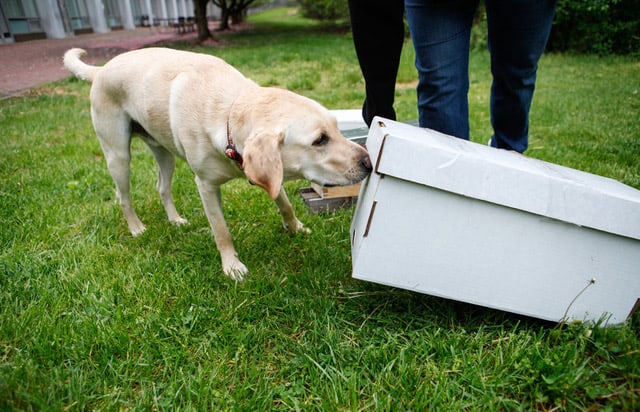Cybil presented an overview of work done by her department and reminded members that registering our hives with the Department of Agriculture is mandatory – and important, since only registered hive owners will be notified about mosquito spraying by email and text this year.
The bulk of her presentation concerned Mack, her canine inspector sidekick, who specializes in detecting American Foul Brood — AFB — a highly contagious bacterial disease that infects honeybee brood and, eventually, kills the colony. Mack and Cybil primarily ensure that hives traveling from state to state for commercial pollination don’t spread AFB in Maryland. (Much to this writer’s regret, Mack did not attend the meeting.)
The Maryland Department of Agriculture has had a "bee dog" on staff since 1982 and is believed to be the only state agency in the nation using a dog to detect AFB. Mack is the fifth dog to hold the position. His predecessor, a black Lab named Klinker, retired last year.
"The program is a unique asset to our department and we didn't want to let it go," Preston says. To keep a dog on staff, Preston set out to find and train a new canine apiary inspector. When she found Mack, he was living in a garage and needed a new home — along with some manners. "He was rude," Preston says. But Mack proved to be a quick learner.
Cybil partnered with the Maryland Department of Public Safety and Correctional Services (Mack was trained by inmate-participants in its canine rehabilitation program) to complete a 14-week training program and have Mack certified as a detection dog.
In the field, Mack works from November to April. When temperatures are cooler the bees are less active, making Mack less apt to get stung. He moves from beehive to beehive, sniffing each one for the distinct odor of AFB infestation. If he smells AFB in a hive, he sits to alert Preston that a manual inspection is needed. He can inspect 100 hives in 45 minutes, while Cybil can open and visually inspect only 10 hives in the same amount of time.
When AFB is confirmed, the antibiotic Terramycin can be used to control the symptoms, but it doesn't destroy the spores; hive furniture infected with AFB is destroyed, usually by burning. Having a canine apiary inspector is an economical option for performing more inspections and improving detection, says Preston, who owns Mack and pays for most of his care. (After Mack earned his AFB certification, the state agreed to pay his vet bills.)
A reminder to our members: When you pay your Maryland State Beekeepers Association (MSBA) dues, you will also be reminded to consider a donation to the Apiary Inspector Fund. The Maryland Department of Agriculture has passed-on budget decreases to beekeeping in years past (there are no full-time dedicated apiculture positions now) and our inspection system needs the donations to make up the shortfall and to continue the current level of service. All donations are dedicated to supporting Apiary Inspection. MSBA suggests that a reasonable donation might be $5 per colony, or $25 per yard. If you’d like to do so right now,
Please make checks payable to "MDA" and send to:
MARYLAND DEPARTMENT OF AGRICULTURE
PLANT PROTECTION SECTION
APIARY INSPECTION
50 Harry S Truman Parkway,
Annapolis, Maryland 21401
-Maureen Jais-Mick



